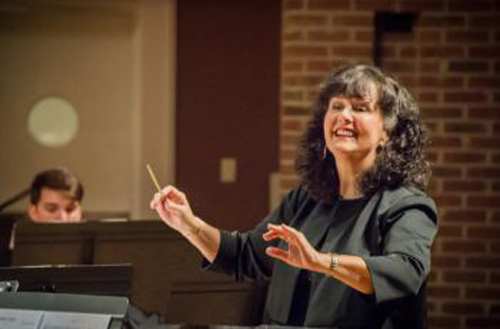By Jordan Beach
The Spring 2020 semester closed out with uncertainty and nonstop changes. As faculty prepare for the upcoming fall semester, changes will continue to alter classrooms – but not their spirits.

Dr. Martha Shaw
The performing arts will face many unique challenges as faculty and students learn to adapt in ways that prioritize health and safety without impeding education. Dr. Martha Shaw, director of choral activities and professor of music, is working to find creative ways for activities like choir rehearsals to continue amid the threats of the virus.
“I’m so grateful to belong to an organization that has really jumped in headlong into research to identify best practices,” said Shaw. “From the beginning, there were daunting problems of singing and not spreading coronavirus.”
Shaw plans to implement several protocols to maintain safe choir rehearsals. Students will take temperatures prior to rehearsal and wear masks and social distance during. Shaw also plans to work with students in smaller groups and practice outside when possible, adjusting best practices as needed.
“We haven’t been doing this yet,” said Shaw. “We’re all making great plans, and we all know when we make great plans that some of it is going to work and some of it isn’t. Some of it’s going to make students uncomfortable, some of it may make teachers uncomfortable – we’re just going to have to see what we can do and take good care of everybody.”
While Shaw plans to safely optimize rehearsals, her 40 years of teaching experience provided the wisdom that some moments in time call for teaching the bigger lessons in life.
“I’ve taught everything from kindergarten to college, and the most important things you teach the students right now are the bigger life lessons of ‘how do we adjust and keep our sanity; how do we get what we need to do done without tearing each other up or without breaking each other’s hearts or without getting each other sick; how do we care for one another, not only musically, and how do I pick songs that really speak to their hearts right now and help them get through this process; how do I teach them how to react to adversity?’ If you think of the big lessons in life, learning how to handle adversity and unexpected things is what greatness is built on all the time.”
Within lessons of adversity, Shaw also wants to take this opportunity to teach young artists what to do when they can’t do what they’ve always trained for, noting difficulties many artists are facing during the pandemic.
“Everybody who’s an artist is in this incredible state of grief because what we’ve trained our whole lives, what I’ve spent my whole career doing, I can’t do the way I know how to do. That’s frustrating, and I can either beat myself up every day because it’s not the way I want it to be, or I can say – and what we can learn – is that this won’t last forever.”
Shaw is grateful for the University’s unwavering support of the arts and the effects the arts have on not only the campus, but the community and the world. She believes that Reinhardt’s students are in the hands of caring faculty, staff and administration.
“We’re going to keep doing this to the best of our ability and make it comfortable for as many people as possible, until we get to the end. We’re a pretty flexible group of people. Reinhardt is a place where we try to find the best common ground and do what’s in the best interest of our students.”
Shaw has already begun to spread her message of encouragement, sending her choir students a letter explaining new protocols, and a glimmer of hope.
“I think it’s very important that we learn what we can, be kind to one another, be uplifting to one another and realize it’s not how much music we learn in the next six months that counts, but it’s how much of dealing with life in its greatest uncertainties and how much we can be a part of making the world a better place. So, we sing songs that make people feel like we hear them, like we share this grief and sadness. But we also have to give a message of hope, because if we don’t give a message of hope, we have nothing to hold on to.”

